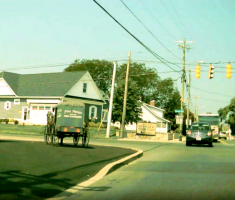
— A 79-year-old Tesla Model 3 driver blames the automaker for a crash that killed a Delaware office worker who was sitting at her desk when the Tesla crashed into the building.
Kaity West, 31, was initially seriously injured when the Tesla crashed into the Bay to the Beach Builders office building, striking West at her desk. Kaity sadly died two weeks later from her injuries.
The Tesla driver, Virginia Laise, is a resident of Virginia and says her Tesla Model 3 should have been equipped with safety features that would have prevented the crash.
The Delaware State Police provided this crash report.
The July 21, 2019, crash occurred when a 2018 Tesla Model 3 was traveling westbound on East Market Street approaching the intersection of southbound Sussex Highway.
"At the last minute the operator of the Tesla changed lanes into the left turn lane of East Market Street, in order to turn left (southbound) onto US 13. For unknown reasons, the operator accelerated rapidly crossing the center line and eastbound lane of travel on East Market Street before exiting the south edge of East Market Street."
The Tesla Model 3 crossed both southbound lanes of travel on US 13 and exited the roadway, traveling into the Bay to the Beach sales office building.
"An employee of the Bay to the Beach [Kaity West] was inside the building working at her desk when she was struck by the Tesla that came crashing through the building."
Plaintiff Says Unintended Acceleration Caused Crash
Plaintiff Virginia Laise says she purchased the 2018 Model 3 from Tesla in June 2018. The plaintiff says the Model 3 experienced "uncommanded, full-power acceleration" while she was slowing to a stop on Route 16 in Greenwood, Delaware.
The plaintiff says she was following her daughter and her family when the plaintiff saw her daughter’s lead vehicle moving to the dedicated left-hand turn lane and come to a stop.
The lawsuit alleges data recorded by the vehicle showed Laise activated her left turn signal and turned her steering wheel to the left to follow her daughter’s car into the left-hand turn.
After slowing to a near-stop behind her daughter’s vehicle, the plaintiff's Model 3 allegedly suddenly accelerated and passed by the lead vehicle on the left-hand side. The plaintiff says she didn't touch the accelerator pedal as the Model 3 accelerated to high speeds and crashed into the building.
The Model 3, capable of hitting 60 mph in 2.9 seconds, allegedly had its Traffic Aware Cruise Control activated at the time of the crash. The plaintiff says the feature had worked correctly for 20 minutes until the incident.
According to the lawsuit, the vehicle’s computer revealed 100% power was commanded from the Model 3. The plaintiff says she responded instantly to the unexpected and uncommanded full power acceleration by steering her Tesla to the left of her daughter’s lead vehicle.
However, that left the Tesla heading straight into oncoming traffic, as indicated in this photo taken from the Tesla Model 3 seconds before the crash.
With the Model 3 hitting nearly 50 mph and still accelerating, the plaintiff was able to avoid the oncoming traffic, an Amish buggy and utility poles before slamming into the building.
The lawsuit alleges Tesla refuses to share all the data from the Model 3 event data recorder even though a driver pays tens of thousands of dollars for their vehicle.
Tesla has been served with several lawsuits alleging unintended acceleration caused crashes, and the U.S. government was petitioned in January 2020 to investigate the alleged problem.
However, in January 2021 the National Highway Traffic Safety Administration said it had reviewed more than 200 complaints and crashes allegedly caused by sudden unintended acceleration in Tesla vehicles.
Safety regulators investigated videos and event data recorders collected from Model S, Model X and Model 3 vehicles and found that based on the evidence, "pedal misapplication" caused the crashes.
The Tesla Model 3 crash lawsuit was filed in the Superior Court for the State of Delaware: Virginia Laise, v. Tesla, Inc., et al.
The plaintiff is represented by McCune Wright Arevalo LLP, and Bailey Glasser, LLP.




